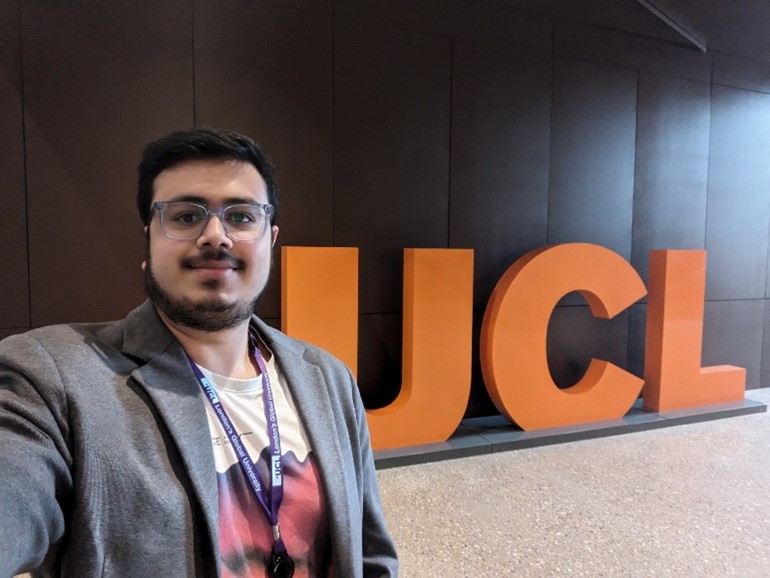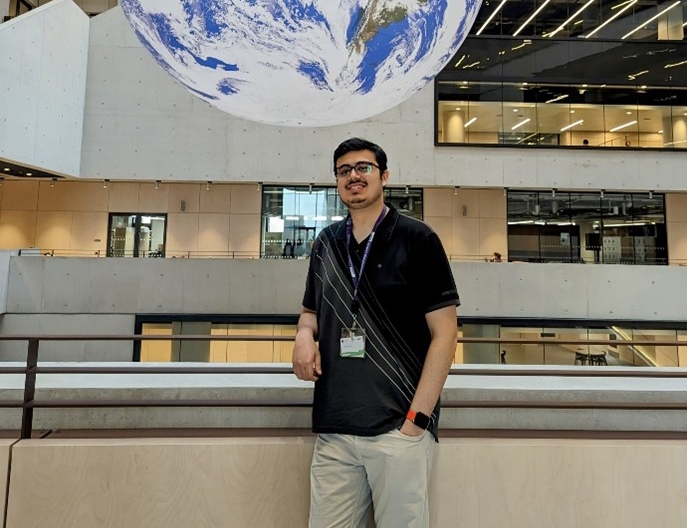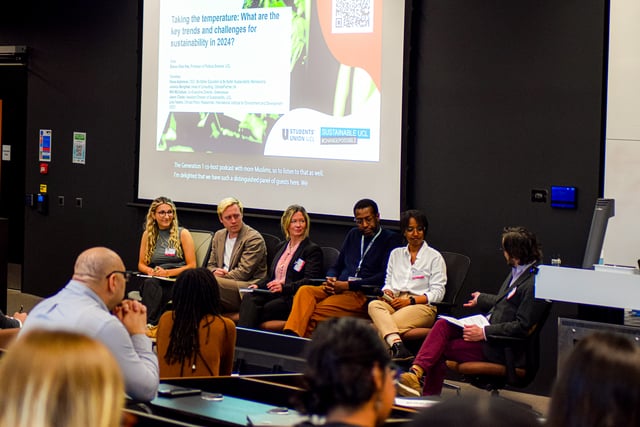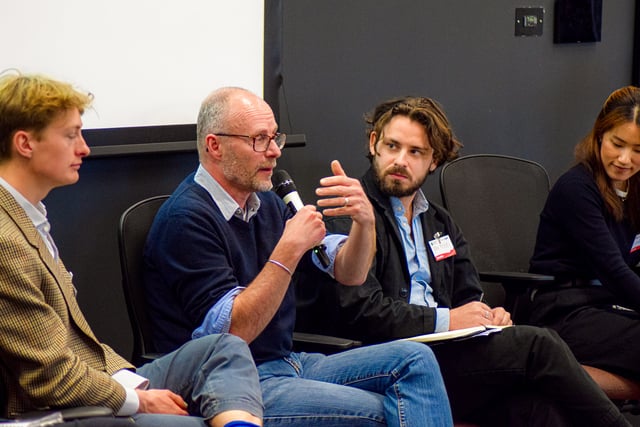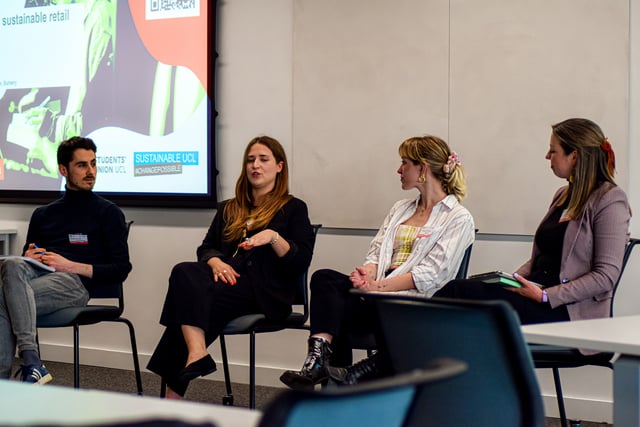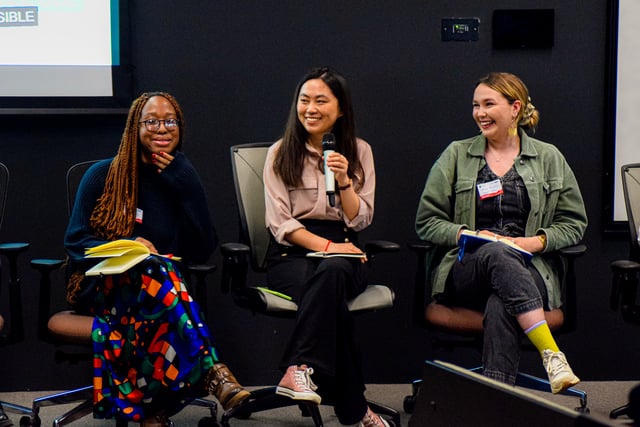Hello, I'm Shashwat, a Master's student in Clinical Neuroscience at UCL.
While I’ve always been passionate about environmental conservation and addressing the escalating climate crisis, as a neuroscience student, I never imagined I’d have the chance to explore careers and opportunities in sustainability.
However, my two-day experience at the inaugural Sustainability Leadership Conference completely changed my mindset and opened my worldview. The conference was a joint initiative between the Students’ Union UCL and Sustainable UCL.
When I stepped into the large hall for the first time and saw the crowd of smartly dressed delegates, all from multidisciplinary backgrounds, I felt a surge of anticipation.
A two-day event packed with workshops, talks, and networking opportunities awaited, promising to empower students like me to become the next generation of sustainability leaders.
Day 1: Setting the stage
The conference began with a warm welcome from Dan Hall, UCL's Sustainability Engagement Officer, promising an exciting two days filled with networking and discussions featuring high-profile sustainability leaders from various sectors.
Alan Salazar Guerra, the incoming Sustainability Officer for Students’ Union UCL, set the tone with a powerful message. He stressed the need for "concerned optimism" over "complacent optimism," urging us to take proactive steps towards sustainability and advocate for systemic change. His story as an international student, campaigning as a youth sustainability leader in Mexico was inspiring and gave me the passionate urge to follow in his footsteps.
Lisa Vanhala, Professor of Political Science at UCL, then took the stage to explore the concept of climate justice and leadership. She emphasised the importance of inclusive decision-making, addressing inequality in climate impacts and amplifying marginalised voices.
The panels that followed were equally insightful. Experts from ClimatePartner UK, Be Better Education & Be Better Sustainability, and International Institute for Environment and Development discussed collaboration, policy-driven sustainability and embedding sustainability in organisational culture.
A concerning statistic shared during the sustainable urbanism panel was that nearly half of all buildings in the UK fall within low energy efficiency standards, with creative solutions such as retrofitting older buildings with solar panels and water efficient taps suggested.
On the brighter side, Naa Ayeleysa Quaynor-Mettle from Reall stressed that sustainable buildings can be affordable and there doesn't need to be a trade-off between sustainability and affordability!
During the networking lunch, I had the opportunity to connect with student-led societies like MODO Fashion Society and Green Economy Society, each making significant strides in addressing the fast fashion crisis and promoting circular economy initiatives respectively.
The afternoon breakout sessions were equally engaging. The first session on 'Our Plastic Planet' resulted in a common consensus that although plastics are required everywhere, they are challenging to replace on short notice. outliving multiple generations of people!
Moreover, tiny microplastics have been found to be widespread in nature, ranging from small fishes in the ocean to being present in our food and even inside our body!
The last session on sustainable food systems saw Leo Taylor from Yum Bug highlighting the benefits of insect-based alternative proteins. Surprisingly despite their small size, insects offer a higher yield of protein per kilogram and require only a small fraction of land, compared to cows and other conventional meats!
Day 2: Deepening connections
The second day kicked off with a workshop by Laurie Laybourn, executive director of the Strategic Climate Risks Initiative, who delivered an inspiring talk on leadership during environmental, social and economic crises, emphasising the urgency to reduce emissions.
Science communicator and conservationist Sara Mahdi then provided insights into effective communication strategies. She stressed the importance of knowing your audience and crafting simple, relatable narratives when communicating about climate change.
Her talk motivated students from all backgrounds to dive into climate conservation, by firmly stating that there is no barrier for entry and a degree is not a must!
The day continued with a workshop by UCL Senior Research Fellow Kate Greer, exploring how tools for long-term thinking can cultivate care for the future and inspire sustainability action in the present. She encouraged us to think about how our actions and legacy in shaping the planet will be perceived by future generations, through group meditation and thought experiments.
The panel on innovation and entrepreneurship was particularly inspiring. Two quotes from projects coordinator at Cambridge Cleantech Satyajit Mohanan and LatAm Business Ltd founder Luz Jaimes Poley on "shaping the future" and "daring to dream" really captured the essence of what an entrepreneur is. There was also discussion around open innovation and companies collaborating together to advance sustainability research.
This was followed by a panel discussion on shifting societal attitudes towards sustainability through the power of the cultural sector. Our eyes were opened to the diverse ways in which sustainable living can be introduced to the masses, such as through sports, TV shows or celebrity influencers.
Breath co-founder Lola Fayokun particularly emphasised the importance of mindfulness, taking it slow, prioritising yourself and valuing what you can bring to the table as a youth sustainability leader.
My take home learnings
Following the conference I will be making some small changes in my life that hopefully will have a lasting effect, such as being more mindful of the transportation I use, eating less meat.
I also hope I am brave enough to get started on running my own initiatives as well as better support the businesses that are already having a positive impact!
My take home lessons from the conference was that anyone can get into sustainability work, whether you have a degree in it or not. Everyone can help promote sustainability in their lives, homes, and jobs, but it does need all sections of communities to be invited and involved in the conversations.
If you want to get more involved with sustainability practices and projects, check out the Students' Union UCL's Sustainability Hub, or Sustainable UCL.
